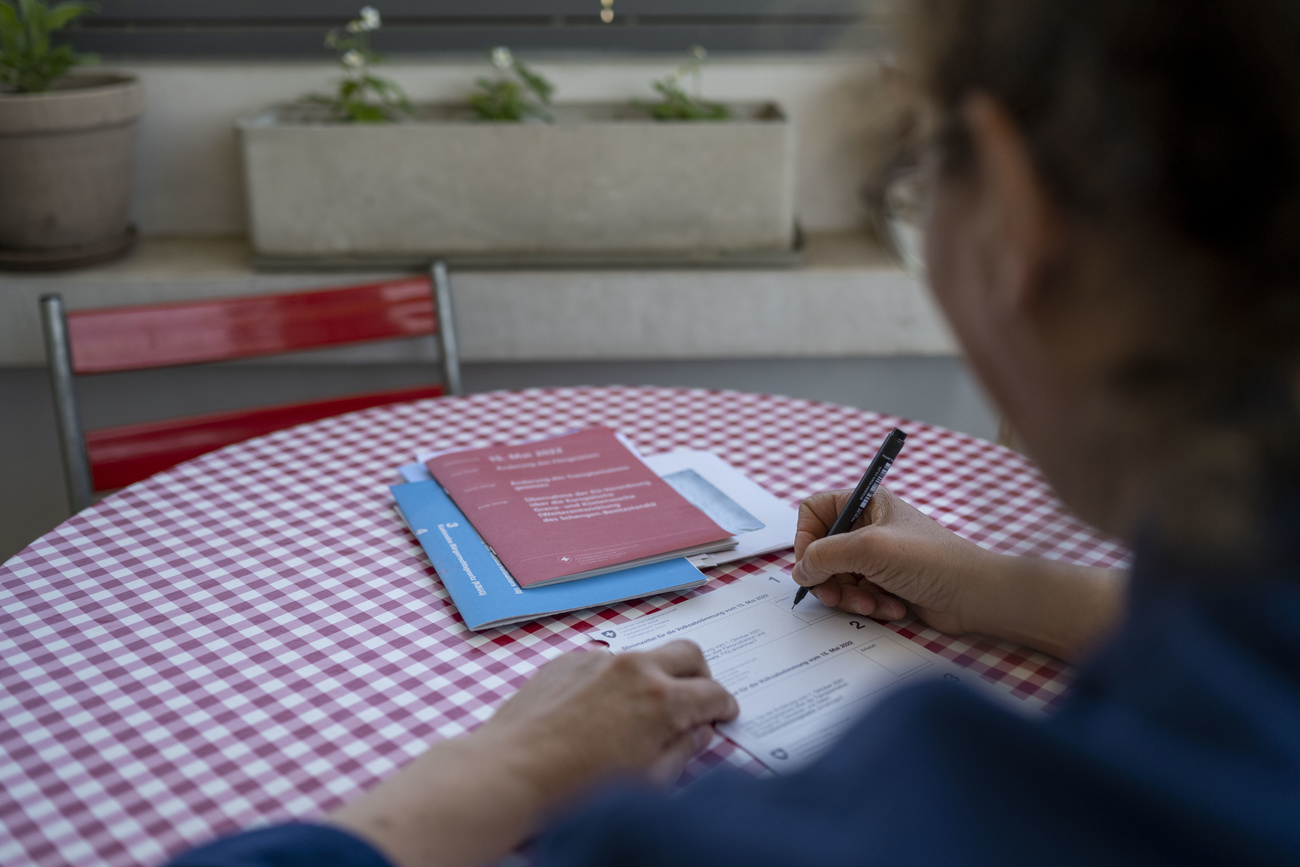How political parties are courting the votes of the Swiss Abroad

In the run-up to the October 2023 federal elections the biggest Swiss parties are reacting to the growing weight of the emigrant community. All now have either an international section or a network for supporters.
A dozen men and women gathered together in Switzerland’s capital city, Bern, in late summer 2022. They worked doggedly, had lively discussions with like-minded people online – and finally lined up at the end of the meeting to take a group selfie, with everyone grinning and giving a thumbs-up.
What was going on? The Liberal Green Party was launching its international section, GLP International. The party felt it was a logical step, as Liberal Green candidates had already achieved noticeable success in the previous federal elections, in 2019.
Founding a section in a small group like this is evidence of a broader trend: the political parties in Switzerland with the largest voting base are leading the way by attaching increasing weight to the role of the Swiss Abroad who want to vote and express their choice. As a result of this step by the Liberal Greens, the six largest parties now all have a foreign section or a network for party members abroad.
Voter numbers rising
This is not surprising given that the number of Swiss Abroad who take an interest in politics and are registered to vote is steadily rising. Around 181,000 eligible people had registered to vote in 2017, and this figure had risen to 218,000 by 2021.
If this trend continues, there may be as many as 230,000 people registered to vote in the run-up to the federal elections on October 22 this year. This also means that the number of Swiss Abroad is growing by around 1.4% on average, but the percentage of eligible people registered to vote is growing at a good three times that rate – 4.7% on average over the last four years.

More
‘What right do I have to decide what happens in Switzerland?’
This changes the political weight of the “Fifth Switzerland” (as the Swiss Abroad are sometimes known). If its potential over the years was comparable to that of Canton Thurgau (178,000 eligible voters), it is now closing the gap – in terms of the number of registered voters – with the cantons of Ticino and Valais. In other words, in close races, votes from abroad could become increasingly decisive.
For the political parties, fulfilling the requirements of those who live abroad is admittedly no less challenging. The six largest Swiss parties are now all investing in the diaspora communities. The acute determining factor remains, however, that federal elections are organised at cantonal level. Yannik Beugger, from the general secretariat of the right-wing Swiss People’s Party, also mentions this: “Nominating candidates is the responsibility of the cantonal parties.”
No constituency
The reason behind the considerable weight of the cantonal parties is easy to explain: there is no “Fifth Switzerland” constituency; the Swiss Abroad are entitled to vote in their home canton and can also only stand for office in that canton. They therefore represent a very fragmented electorate overall, rather than a political unit.

More
New app strengthens Switzerland’s link with citizens abroad
The international chapter of the People’s Party, according to Yannick Beugger, will now at least seek dialogue with cantonal parties where there are independent lists of Swiss Abroad candidates standing.
The left-wing Social Democratic Party has already had a similar experience. In 2019, its SP International ran an independent campaign, ran its own lists in several cantons, and was able to set its own agenda. At the upcoming 2023 federal elections, the Geneva section of the party is expected to field a separate list of Swiss Abroad candidates. Apart from that, the Social Democrats are pursuing the goal of fielding targeted lists of candidates from the “Fifth Switzerland”. In addition, according to SP international secretary Sandro Liniger, campaign rallies are to be held in key states.
Lost votes
Anyone talking about the political weight of the Swiss Abroad cannot avoid broaching the relatively charged subject of e-voting. Electronic voting is currently no longer possible in any canton. This means that many Swiss people, particularly those overseas, who are interested in politics, are effectively excluded from political participation in Switzerland. Their postal votes often do not reach Switzerland in time.
Social Democrat Sandro Liniger says that “without e-voting, turnout among the Swiss Abroad is around one-third lower than it is with e-voting.” SP International is therefore campaigning for e-voting to be introduced.
It is not alone in making this demand. The Swiss Abroad can exert their own pressure: the more they register to vote, the more urgently an answer is needed to the question of how exactly they are to exercise the political rights granted to them.
______________________________________________
Political parties and the Swiss Abroad
Swiss People’s Party
The People’s Party was one of the first Swiss political parties to have party structures abroad: It’s SVP InternationalExternal link was founded in 1992. It has sections in Costa Rica, Côte d’Ivoire and South Africa, and has “country contacts” in Liechtenstein, Norway, Britain and Hungary. SVP International is chaired by Inge Schütz (Switzerland), who lived in Sweden for years.
2023 elections: SVP International is currently engaged in negotiations with cantonal parties in the cantons in which it is running separate lists. Cantonal sections are responsible for nominating the candidates. They are free to include candidates from the Swiss Abroad on their party ticket.
The People’s Party came out of the 2019 federal elections as the clear overall winner in terms of number of votes. It won a 25.6% share of the vote (down from 29.4% in 2015). The party has two seats in the seven-member government.
Campaign issues: by its own account, SVP International pursues the objective of addressing the specific concerns of the Swiss Abroad – concerns that can differ very widely from one geographical region to another – and raising awareness among People’s Party parliamentarians accordingly: “This ensures the interests of the Swiss Abroad are taken into account during the parliamentary process.” The party feels that its own core principles will also appeal to the Swiss Abroad: a secure, independent Switzerland; direct democracy; neutrality in its global sense; and clear boundaries with the European Union.

More
Do the Swiss Abroad have enough power?
Social Democratic Party
The Social Democrats have had an international section, SP InternationalExternal link, since 1999. This section is chaired by Gaëlle Courtens (Italy) and Pierre-Alain Bolomey (Switzerland). To promote mutual communication, SP International has also developed a network of so-called SP antennas. These antennas either bring members together at a local level (Berlin, Brussels, Rome, France, Israel) or help bring members who are scattered in more remote locations (Africa, USA) within the fold of the network.
Based on the experience that voter participation among the Swiss Abroad is around one-third lower without e-voting, SP International has introduced several resolutions in the national party in favour of e-voting. The section also played an active part in the European parliamentary elections in 2019. SP International currently has around 150 members.
2023 elections: the Social Democrats advise their cantonal parties to nominate candidates from the “Fifth Switzerland” too. The party is also planning on running a separate list in Canton Geneva featuring candidates from the diaspora.
The Social Democratic Party came in second place in the 2019 elections. It won a 16.8% share of the vote (18.8% in 2015). Two of the seven current members of the government are from the party.
Campaign issues: SP International’s alignment during the 2019 federal elections was clear, as the international section led its own electoral campaign. It focused on the issues of social security, the Swiss bank accounts of the Swiss Abroad, the free movement of persons within the EU, fair taxation and the question of representation for the diaspora.
Radical-Liberal Party
The centre-right Radical-Liberals have had an international section since 1992. FDP InternationalExternal link works not only to connect the Swiss Abroad, but also to bring their issues to the attention of party members, the parliamentary party and the party leadership through lively discussions. FDP International is also active at a European and global level and collaborates with The Alliance of Liberals and Democrats for Europe Party and Liberal International, as well as helping its mother party maintain good international party relations. The chairperson of FDP International is Helen Freiermuth (Turkey).
FDP International sees the introduction of the foreign ministry helpline as a central point of contact for the Swiss Abroad as its own achievement. The helpline was introduced following a motion from independent parliamentarian Martine Brunschwig-Graf (Geneva), which she – encouraged by a suggestion from FDP International – had submitted in 2011.
2023 elections: FDP International is working with the national Liberal-Radical party and its cantonal sections to clarify the options for lists including the Swiss Abroad.
The Liberal-Radicals, which also have two seats in government, are going into the elections in third place. They won a 15.1% share of the vote in 2019 (16.4% in 2015).
Campaign issues: FDP International represents a “cosmopolitan liberalism”. It views its role as an international section as “a political homeland for liberal Swiss Abroad”. It also fights for the specific concerns of the Swiss Abroad within its own party and represents liberal solutions in the Council of the Swiss Abroad, the de facto parliament of the diaspora.

More
Swiss Abroad blame e-voting failure for falling turnout
Centre Party
The CentreExternal link, formed from the merger of the Christian Democrats and the Conservative Democratic Party in 2020, has no foreign section but does have a network of interested people under the name Die Mitte International (The Centre International). The people involved in this network are often members of a Centre cantonal party. Contact with the network – and communications with sister parties abroad – are the responsibility of the delegate for international affairs, appointed by the party leadership. The current delegate is National Councillor Elisabeth Schneider-Schneiter (Basel-Land).
Various figures in the Centre Party have shown a strong commitment to the Swiss Abroad community, the Council of the Swiss Abroad and the committees of the Organisation of the Swiss Abroad (OSA).
2023 elections: the party welcomes the nomination of “people with a strong local presence” from abroad, but does not make having them as candidates a requirement for the cantonal parties.
The two predecessor parties of the Centre won a combined share of 13.9% of the vote in the 2019 elections (15.7% in 2015). The Centre party has one seat in government.
Campaign issues: one key demand from the Centre with regard to the Swiss Abroad is e-voting. The party believes that e-voting should be introduced quickly and permanently for Swiss people abroad. This comes against a background of people often receiving their voting materials and ballot papers too late. The Centre Party is not, however, running a separate election campaign for the Swiss Abroad. Its motto is: “We stand for the cohesion of all Switzerland, and this naturally includes the ‘Fifth Switzerland’.”
The Green Party
The GreensExternal link are as yet without an international section. Party members living abroad are currently being sounded out on how they want to consolidate the Greens’ work, whether as members of a network or even an entirely new international section. At the same time, internationality is a reality for the Swiss Green party. They are already working together with the Global Greens and the European Greens. Their events are also always intended for the Swiss Abroad.
Swiss Abroad vote Green more often than Swiss people on the whole. For example, they delivered a resounding yes to the C02 law, which fell narrowly short at the polls in June 2021. The Greens also see it as a success that party members living abroad are making a direct contribution, such as to the compilation of the Greens’ 2023-2027 manifesto.
2023 elections: the party advises its cantonal sections to nominate candidates from the Swiss Abraod too. In Canton Geneva, cross-border candidates are once again allowed to form their own list.
The Greens were very successful at the 2019 elections. Their share of the vote rose to 13.2% (7.1% in 2015). They have no representatives in the government.
Campaign issues: the Swiss Green Party is relying on political messages – including protecting the climate – that will appeal in equal measure to Green voters within Switzerland and abroad. The Greens will therefore not be running a campaign that specifically targets the Swiss Abroad.
Liberal Greens
GLP InternationalExternal link, founded in September 2022, is the newest international section of a Swiss political party with a strong voter base. The aim of GLP International is “to respond to the desire of the Swiss Abroad to take a more active involvement in Swiss politics, and to ensure that their ideas and perspectives are heard” , thereby “contributing towards the modernisation of Swiss politics”. GLP International is chaired by Thomas Häni (Germany).
GLP International currently has around 60 members and around 200 sympathisers.
2023 elections: the party is looking to encourage as many Swiss Abroad as possible to stand as GLP candidates in the 2023 elections.
The Liberal Greens made strong gains during the previous federal elections in 2019. The GLP scored 7.8% of the vote at that time (4.6% in 2015). It is the sixth-largest party and has no representatives in government yet.
Campaign issues: GLP International wants to position itself as “a forward-facing, progressive, solution-orientated and cosmopolitan party”. Webinars are being organised on current topics in Swiss politics to bring the Liberal Green agenda home to the Swiss Abroad.
This article was originally published in the Swiss ReviewExternal link magazine.

In compliance with the JTI standards
More: SWI swissinfo.ch certified by the Journalism Trust Initiative
You can find an overview of ongoing debates with our journalists here . Please join us!
If you want to start a conversation about a topic raised in this article or want to report factual errors, email us at english@swissinfo.ch.